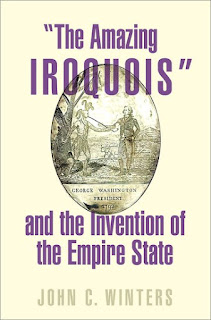 Thomas Paine Studies at Iona College. A public historian, he has also worked in historic homes, museums, and other institutions.
Thomas Paine Studies at Iona College. A public historian, he has also worked in historic homes, museums, and other institutions.
Winters applied the "Page 99 Test" to his new book, "The Amazing Iroquois" and the Invention of the Empire State, and reported the following:
In the case of “The Amazing Iroquois” and the Invention of the Empire State, the Page 99 Test just so happens to reflect one of the important themes of the book. The 99th page lands on a vignette at the conclusion of Chapter 2. The chapter is a biography of Ely S. Parker, a Seneca chief of the mid-late nineteenth century who was General Ulysses S. Grant’s military secretary during the Civil War and later served as the first indigenous Commissioners of the Bureau of Indian Affairs (BIA).Visit John C. Winters's website.
On page 99, readers find themselves in Northern Virginia in December 2000 at a dedication of a BIA building in Parker’s name. Key among the officiates is the former Assistant Secretary of Indian Affairs, Kevin Gover, who suggests in a speech that Parker, by his very existence, was a “paradox.” This is a common enough assumption among those who feel that there must be some universal standard by which we can measure indigenous authenticity. This assumption typically casts any historical indigenous figure who embraces colonial influence or participates in colonial society as assimilated, and since assimilation cannot coexist with indigenous authenticity, at least according to this arbitrary cultural purity test, the two must be mutually exclusive.
Based on that assumption, Gover raises a few issues. He pokes at the idea that Parker, a person who tried so hard in life to be accepted into elite white society and moved away from his homeland permanently, is a paradox because he does not qualify as an authentic Seneca. That assumed, would Parker even appreciate that his name now graced a building of a notoriously unpopular government agency that many indigenous peoples have protested since its creation in the early nineteenth century?Probably. Parker was, after all, a firm believer in the power of a just and powerful federal government to change Native American life for the better, even if he himself was not able to implement those changes. What he would not have understood quite as well was Gover’s comment on the paradoxical nature of his being an assimilated Indian. Parker thought that assimilation was the solution to the “Indian problem”… [and] in addition, his people his reputation and acceptance by white America shielded him and, he hoped, his people from the worst impulses of a society and a government that by the end of the nineteenth century proved violently intolerant of difference.Parker was, to call on a phrase evoked by the historian Philip Deloria, an Indian in an unexpected place. But this section also shows that he brought an unexpected ‘Indian-ness’ to spaces that white Americans thought belonged only to them. In “The Amazing Iroquois”, the Page 99 Test reveals a small part of a history in which Parker and his Seneca kin were not simply passive receptors of colonial influence—they were true agents who shaped aspects of New York and American culture and history in their own, and in their own peoples’, image.
Gover’s…moral judgement about Parker’s life casts the nineteenth-century Seneca chief as morally ambiguous at best and inherently wrong at worst in his actions. [But these] flat portrayals of assimilated peoples as a historical “paradox” [is problematic]. There is no question people like Parker often regurgitated what white audiences wanted to hear, often for their own benefit, but a more critical analysis of Parker’s life reveals a far more complex history. He was indeed assimilated, in fact he took steps to ensure that happened, but by speaking on the colonizer’s own terms in their own language, he was also able to shape public opinion about the Iroquois in surprisingly sensitive ways. [It was the fact of his assimilation that enabled him to influence] the way future generations of New Yorkers remembered the Iroquois, even if they forgot that it was the Iroquois themselves who had popularized aspects of their own history and told those stories on their own terms.
--Marshal Zeringue



